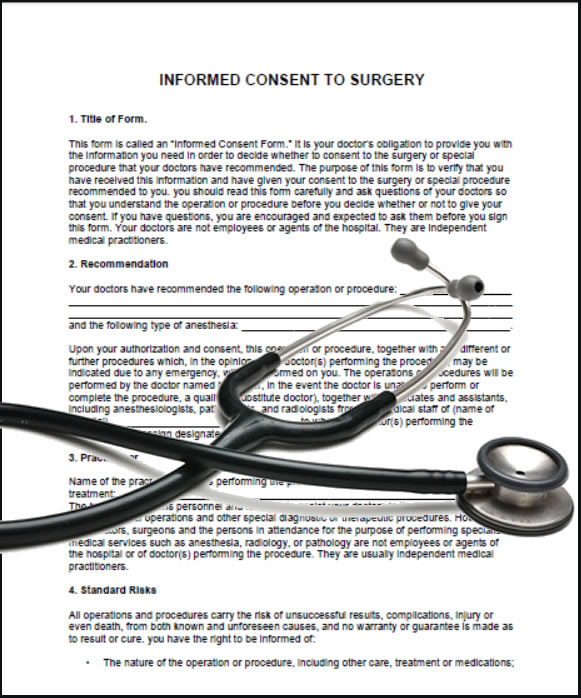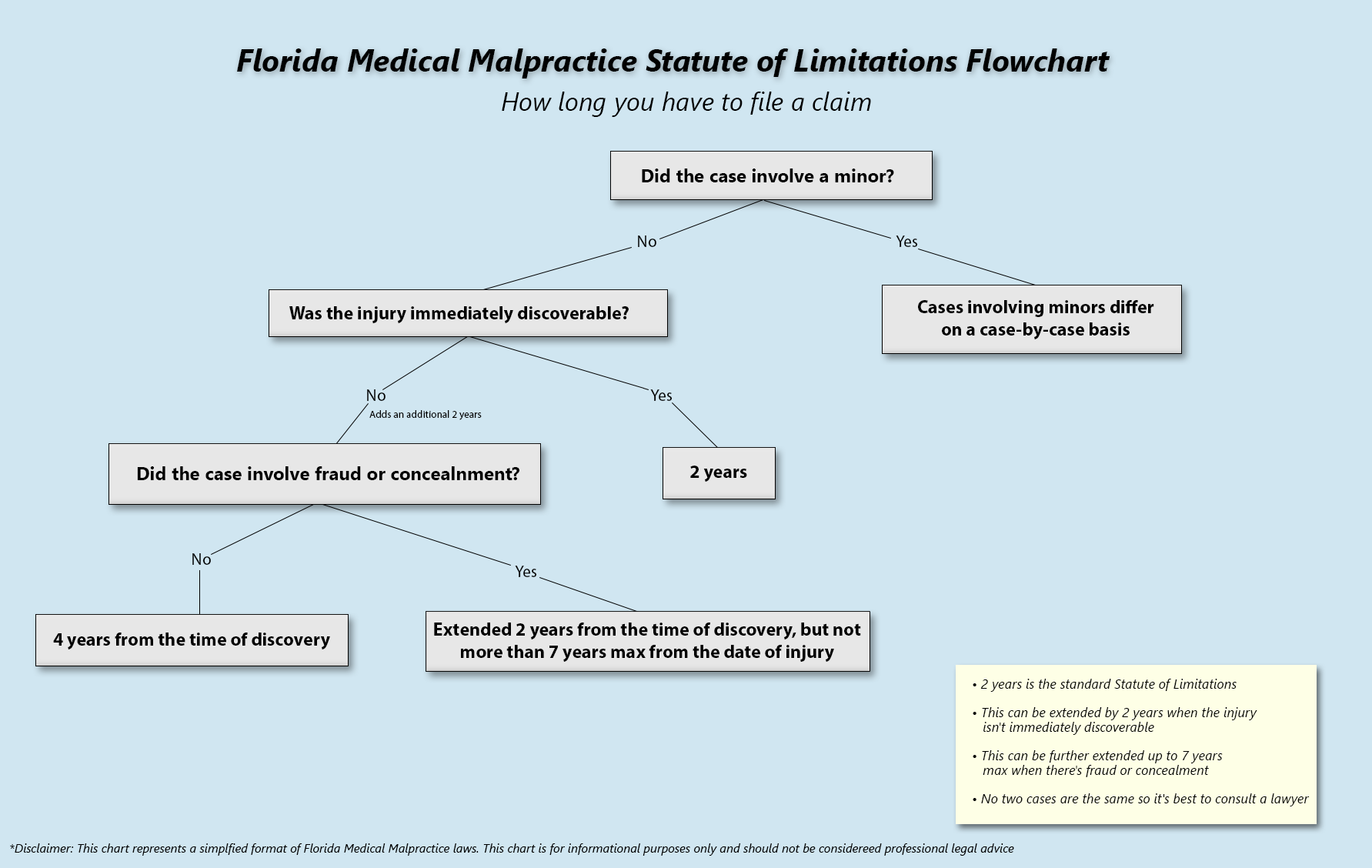 Medical malpractice statutes vary from State to State. Florida’s laws regarding medical negligence are extremely complex. In fact, recent changes to these laws make filing claims more difficult for injured parties. This article covers the topic of medical malpractice in Florida. This includes details such as what’s considered “malpractice,” types of malpractice cases, and what you should do if you believe that you have a case.
Medical malpractice statutes vary from State to State. Florida’s laws regarding medical negligence are extremely complex. In fact, recent changes to these laws make filing claims more difficult for injured parties. This article covers the topic of medical malpractice in Florida. This includes details such as what’s considered “malpractice,” types of malpractice cases, and what you should do if you believe that you have a case.
It’s important to note that information within this page can help guide someone in the right direction; however, this is not a substitute for professional legal advice. If you or a loved one has been injured by a medical professional, it’s important to seek advice from a malpractice lawyer as soon as possible as there’s a statute of limitations on your claim.
Medical Malpractice Definitions
To help readers better understand the context of the article, here are some of the most common terms found within this content.
Med Mal – This is simply a shortened use of the term “medical malpractice.”
Medical Negligence – As the name suggests, medical negligence refers to a medical professional acting negligently. In order to prove a malpractice claim, it’s required to show that the medical professional did in fact act with “negligence” while performing the duties of their job.
Statute of Limitations (SOL) – The Statute of Limitations refers to the time limit someone has to file a malpractice claim after discovering the injury.
Damages – Simply put, damages refer to the physical or mental ailments someone suffers; in this case, the “damages” resulting from a medical injury
Malpractice Insurance – Healthcare providers have medical malpractice insurance to protect them against potential claims. Large hospitals always have this type of coverage. In most medical malpractice cases, the insurance company for the healthcare provider is the one who pays out damages.
Standard of Care – This is the legally required level of care a healthcare provider must give to their patients. In Florida this is defined as the level of care, skill, and treatment that given all the facts of the patient and her or his condition, is recognized by their peers and the law as acceptable and appropriate care.
Proximate Cause – This refers to the cause of your injury. In other words, you must provide proof that if it weren’t for your doctor’s negligence, you never would have been injured.
Misdiagnosis – Misdiagnosis occurs when someone’s medical condition is mistaken for another condition or missed entirely. In certain cases this incorrect diagnosis can be fatal as it can result in not receiving proper treatment or lead to unnecessary harsh treatments such as chemotherapy for an incorrect cancer diagnosis. This is also referred to as “late diagnosis,” “missed diagnosis,” or “failed diagnosis.”
Improper Treatment – As the name suggests, improper treatment refers to a medical professional issuing the wrong treatment for a specific condition. For example, if an incorrect medication is prescribed, in some cases, this error can cause serious complications including death of a patient.
What Defines Medical Malpractice?
Various legal standards must be met in a medical malpractice case. Every unsuccessful surgery is NOT a medical malpractice case. Sometimes people die or there are complications even though a surgeon or medical professional did everything to the best of their ability. Of course, a few elements must be present to BRING a case. These elements include:
- A formal doctor-patient relationship
- The doctor or medical professional acted negligently
- The patient was injured
In Florida, to PROVE a case you must have two main elements:
- A breach of the standard of care
- Causation
 The Florida’s Malpractice Act requires that you prove that a medical professional did not provide adequate care to you or your loved one. In order to prove this, another medical professional from the same field must testify in court or sign a sworn affidavit. Without this testimony or legal document your case is thrown out. For example, if you or a loved one received an inaccurate or late cancer diagnosis, you must have another oncologist testify or give your attorney a sworn affidavit backing your claim of malpractice.
The Florida’s Malpractice Act requires that you prove that a medical professional did not provide adequate care to you or your loved one. In order to prove this, another medical professional from the same field must testify in court or sign a sworn affidavit. Without this testimony or legal document your case is thrown out. For example, if you or a loved one received an inaccurate or late cancer diagnosis, you must have another oncologist testify or give your attorney a sworn affidavit backing your claim of malpractice.
Proving causation is another requirement under Florida law. Basically, you must prove that your doctor or other medical professional’s negligence caused your injury. In other words, the medical person’s actions or inactions contributed to an injury or death.
Examples of Medical Malpractice
Medical professionals are human and may make mistakes. However, certain standards must be followed in the medical profession to ensure patient safety. When these precautions are not followed, when necessary tests are not ordered, or when assaults occur, you have ground for a medical malpractice claim. Some examples of medical malpractice include:
- Misdiagnosed or undiagnosed conditions (i.e. cancer, appendicitis, strokes, or heart attacks.)
- Medication errors (i.e. incorrect medication or wrong dosage of medication)
- Birth injuries
- Surgery errors (i.e. operating on a wrong body part, leaving a tool or object inside a patient)
- Anesthesia improperly administered
- Emergency room errors
- Contracting a disease while at the hospital
- Improper treatment of a medical condition
- Medical equipment failure
Statute of Limitations
The Statute of Limitations (SOL) for medical malpractice cases can be found in Florida Statutes 95.11(4) (b). The law states you must file a malpractice suit within two years of the date from which you discovered the harm- or two years from when you reasonably should have discovered the harm from the negligence. There is a blanket deadline of four years from the date of the actual alleged medical malpractice event. Finally, in regards to minor children under the age of eight, the lawsuit must be brought before their eighth birthday.
Florida law does have a “fraud” exception to the statute of limitations. If there is fraud, or any attempts to conceal or intentionally misrepresent any facts related to the injury, the period of limitations is extended forward two years from the time it is discovered. In cases of fraud, the deadline is extended up to seven years. Basically, no medical malpractice lawsuit can be filed in Florida if more than seven years have passed since the incident occurred.
We wrote an article on Florida’s SOL for malpractice cases that covers this topic in far greater detail.
Damages From Medical Malpractice Lawsuits
Florida did have a “cap” on non-economic damages. The monetary cap was set at $500,000 against practitioners and $750,000 against non-practitioners. Non-economic damages included:
- Loss of quality of life
- Anxiety
- Trouble sleeping
- Mental anguish
- Chronic pain
This cap NEVER applied to economic losses such as future earnings, medical costs or medical care.
It’s important to note that in a recent Florida Supreme Court case North Broward Hospital Dist. v. Kalitan, the caps on damages were overturned. So, Florida no longer has caps on non-economic damages. However, a new bill may be introduced at any time reinstating caps on compensatory or punitive damages. In fact, the Florida Legislature tried to go around the Florida Supreme Court with HB 7077. (This bill died in committee.) Basically, it remains important to discuss your case with an attorney to understand current statutes.
Proving a Malpractice Case
In order to successfully prove a medical malpractice case, several factors must be present. Below are some of the details required for one of these claims to be successful.
Breach of the Standard of Care
The victim must provide evidence that the doctor, nurse, or other medical malpractice breached the standard of care according to the laws in Florida that were owed to you or your loved one.
The Florida Malpractice Act requires victims to locate a medical expert who practices in the same field as the doctor who committed the alleged malpractice. You must also obtain an affidavit from that medical expert or your claim will likely not go through.
Proximate Causation
You must also prove causation, meaning it’s your burden to prove that the doctor’s breach was the “proximate cause” of your injury.
In other words, you must provide proof that if it weren’t for your doctor’s negligence, you never would have been injured.
Damages
Be forewarned that it’s not cheap to initiate a malpractice claim in Florida. If you’re thinking of bringing about a lawsuit, you must be able to prove you were significantly harmed first.
You’ll have to prove you had to endure significant medical expenses, lost time from work, and have experienced significant amounts of pain and suffering.
Relevant Circumstances
Since every situation is different, how your doctor behaves is dependent upon the surrounding circumstances. A doctor is only able to provide certain care depending on the medical equipment what information they have available to them.
In other words, if you fail to notify your doctor you’re taking a certain medication and they prescribe another medication that adversely interacts with the original medication, it’s possible your doctor won’t face legal responsibility for your reaction.
That’s because your doctor did not receive enough facts in order to provide you with reasonable care.
Specialists
A doctor who is trained as a specialist has a higher level of standard of care because they have more knowledge in their field that a family doctor does.
If your injury is caused by a specialist, you would hold them to the same standard of care as other specialists within their field.
Foreseeing the Injury
There’s another requirement injured parties in Florida must prove. You need to provide proof that your injuries weren’t reasonably foreseeable or an inevitable or necessary result of the medical treatment you received.
Of course, this is only as long as the treatment was provided competently to you.
In other words, if you have open-heart surgery, the surgeon must cut through your breastbone to reach your heart. It’s expected that there will be pain and suffering as a result. You can’t sue your doctor for this unless you can prove the doctor didn’t perform the surgery properly.
Start a Detailed Investigation
An injured party or the family of an injured party should always work with a medical malpractice attorney who is an expert in Florida malpractice laws. These cases are too complex to manage on your own.
An experienced attorney will begin by conducting a detailed investigation. They will start by speaking with the victim or their family to get a detailed story and timeline.
The next step is to review the victim’s medical records. Without those records, it’s nearly impossible to prove and win a lawsuit because it becomes a he-said, she-said argument between the patient and the physician and often the physician wins.
There can be a lot of red tape and struggles involved in obtaining medical records, even though they’re your own medical records. The process often involves legal hurdles that are best left for your attorney to deal with.
Submitting Medical Records
Once your attorney has obtained your medical records, their next step is to consult with a qualified medical expert for an independent review. The medical expert will review your records to determine whether or not they believe the care the victim received deviated from the national standards of care.
If the medical expert finds this way true, they then determine whether or not the care the victim received caused their injuries. That’s because it’s not enough to prove your doctor deviated from the standard of care for you to win your case, you must prove that their actions or inactions caused or substantially contributed to your injuries.
If the medical expert can prove that the healthcare provider deviated from providing a standard level of care and that there was causation that resulted in injuries, the next step is for the malpractice claim to enter a pre-suit.
Entering into a Pre-Suit
A pre-suit is a 90-day period where the healthcare provider whom you are pursuing a claim against can conduct their own good faith investigation to determine whether any deviations occurred. After 90 days, the healthcare provider may take one of the following actions:
- Make a monetary offer to settle the case
- Deny the claim
- Do nothing
At this point, the victim and their attorney will discuss their options and decide whether or not they want to continue to pursue a lawsuit against the negligent parties.
Types of Medical Professionals
Doctors and surgeons are not the only ones who can be held responsible for medical malpractice. There are other medical professionals who are responsible for providing a proper standard of care. Examples of these healthcare professionals include:
- Physician’s assistants
- Dentists
- Radiologists
- Optometrists
- Chiropractors
- Nurses
- Pharmacists
- Pharmacy technicians
- EMTs and paramedics
- In-home health aides
- Anesthesiologists
- Psychiatrists
- Alternative medicine providers
It’s important to note, individual practitioners are not always the ones responsible in a court of law. This is particularly true in malpractice cases involving a large hospital or healthcare provider. In these cases, the hospital can be held liable and ordered to pay out damages for medical negligence.
Frequently Asked Questions
Q. What is medical malpractice?
Medical malpractice occurs when a doctor, surgeon, hospital, or other medical professional injures a patient due to negligence on their part.
Q. What is medical negligence?
Medical negligence occurs when a doctor or healthcare professional fails to meet the “standard of care” required by their job.
Q. How much does a medical malpractice lawyer cost?
Many medical malpractice lawyers will not charge any fees for legal consultations or to pursue your case. In fact, they will often assume the risk and structure their pricing contingent on them winning your case. If the case is successful, the lawyer will usually take a cut of the settlement, which is typically around 30%. Of course fees and pricing structures will vary for each law firm.
Q. What type of compensation can I receive?
Although every case is unique, the compensation you receive will depend on factors such as malpractice insurance, the extent of the injuries, the effect it has on your life and career, etc. In Florida, there’s no economic cap on the amount you can receive for damages in malpractice suits.
Q. How long do you have to file a medical malpractice suit?
In Florida, you have 2 years to file a claim from the time which the injury was discovered. Additional time may be added in cases where the injury was not immediately discoverable or in cases involving fraud, concealment, or minors. In short, you generally have between 2-7 years to file a malpractice claim depending on the circumstances of your case.
Cited Sources
- The Florida Senate (2022). The 2022 Florida Statutes (including 2022 Special Session A and 2023 Special Session B). Retrieved from http://www.leg.state.fl.us/Statutes/index.cfm?App_mode=Display_Statute&URL=0700-0799/0766/Sections/0766.102.html


